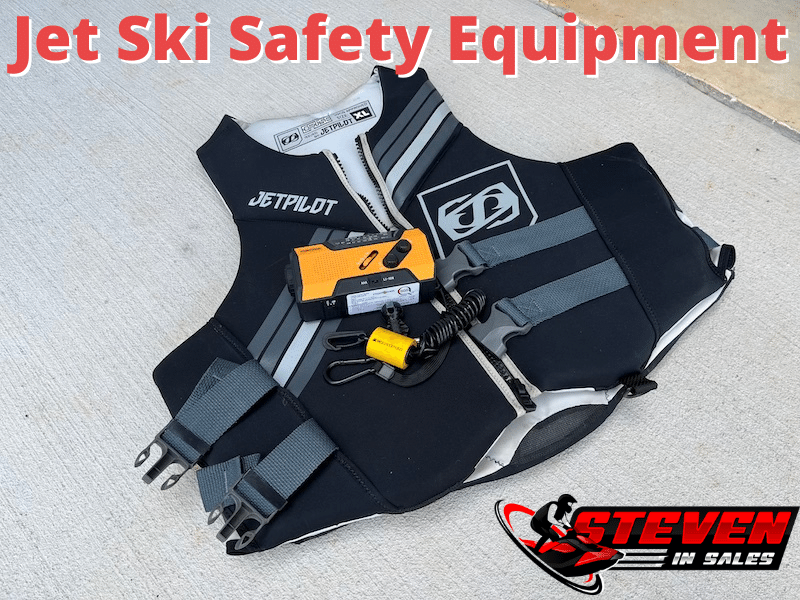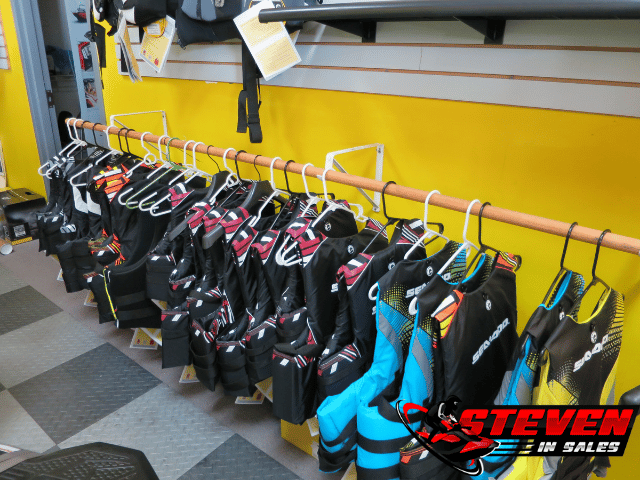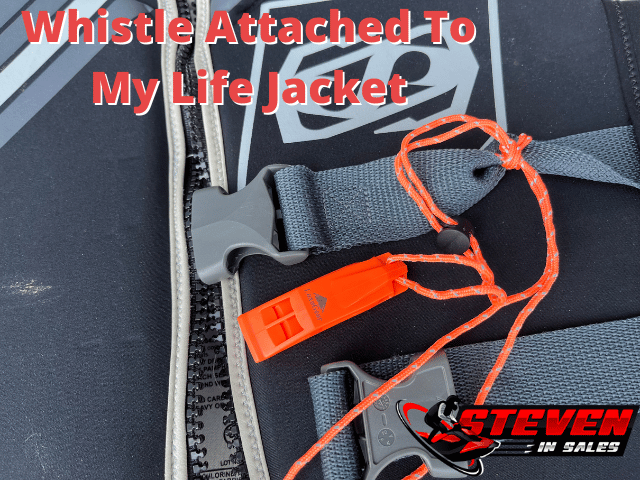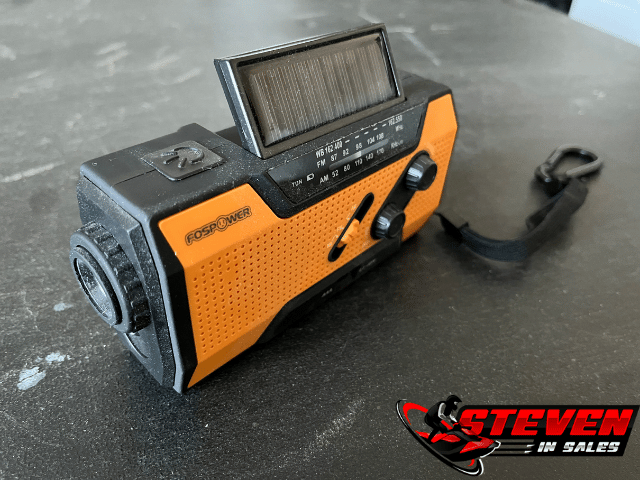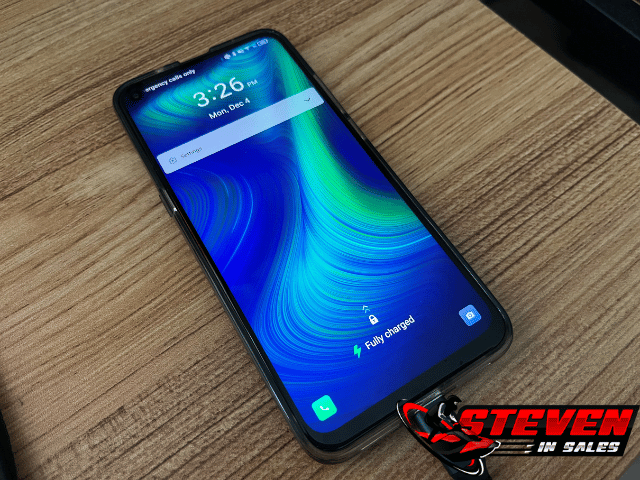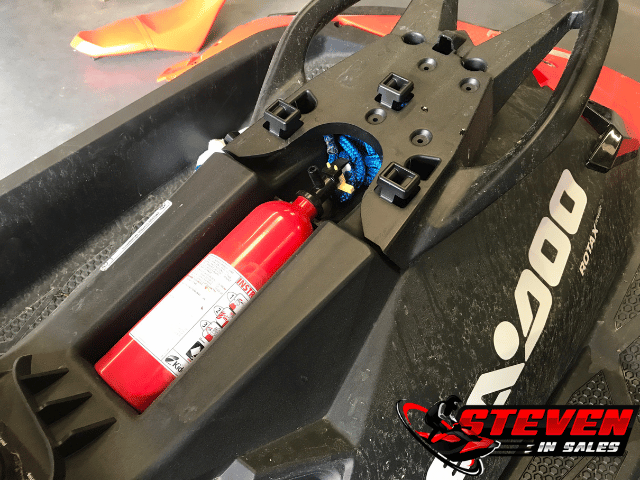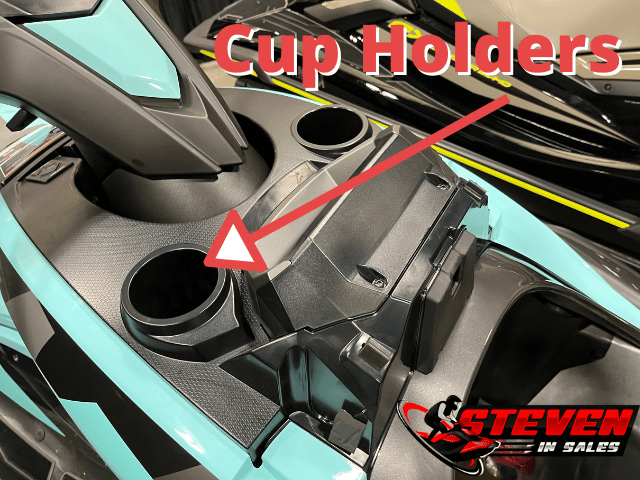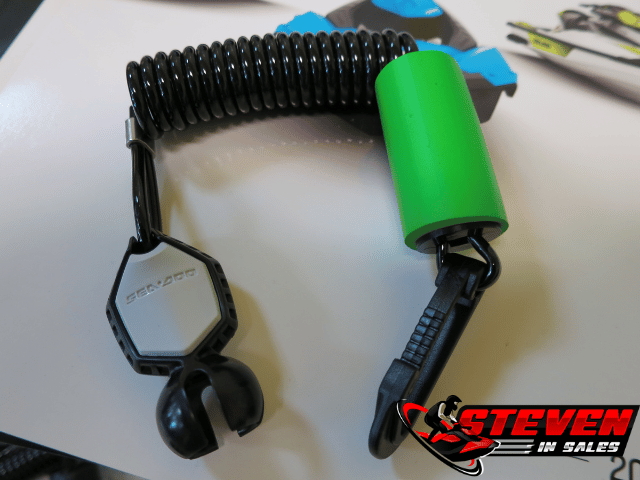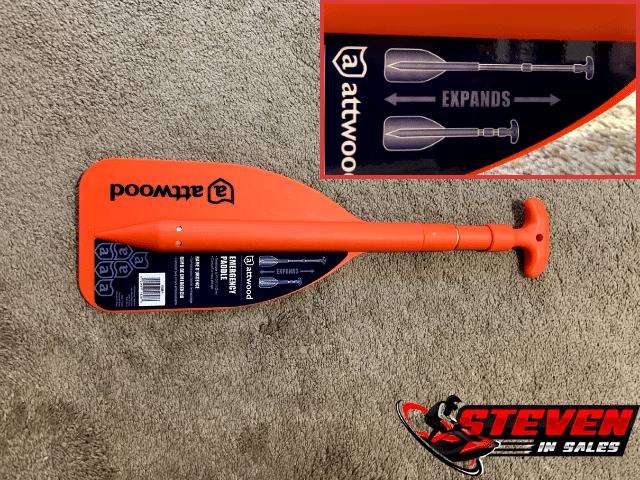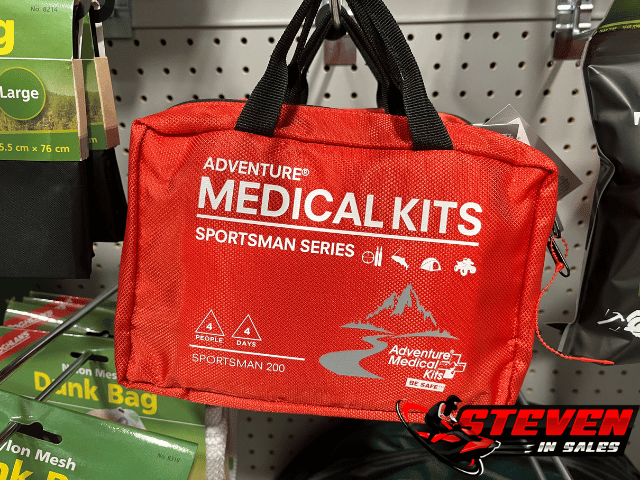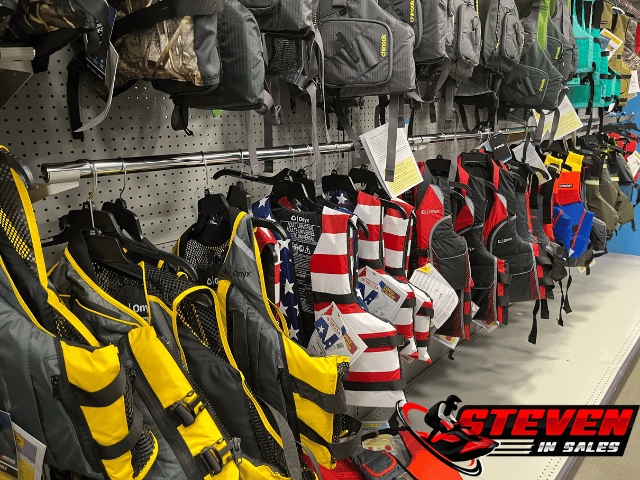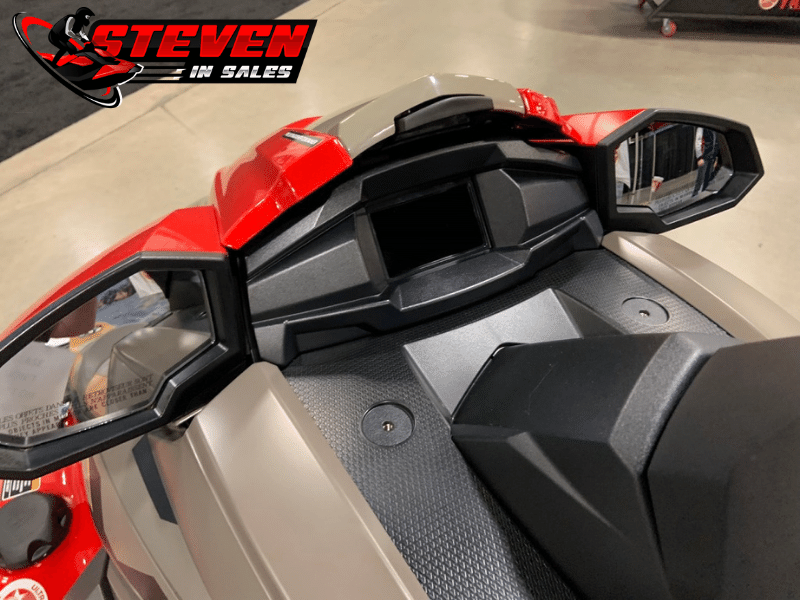Before you get on your PWC and ride away, there maybe a few questions you have. There are also many things that get ignored that could get people hurt.
Safety is a huge deal for any watersports. Things like, what life jackets do you need? Do you need a whistle? What if you get lost?
So much to unpack here. I’ve been noticing new riders start to wonder about these questions, so I’ve dug in and researched it. There were some obvious things, but a few things that many people don’t consider.
Let’s go over it all below!
Before You Ride!
Before you get on a jet ski, especially if you’re new to one, there are a few things you should do.
- Make sure to take a boater safety course and get your required license.
- Learn the controls of the jet ski, know where the throttle and brake levers are, yes, many models have brakes.
- Understand your owner’s manual.
- Make sure you wear the proper gear, see our post on what to wear, especially the wetsuit bottoms area.
- Don’t forget to put your drain plugs in!
- When refueling and after, make sure to take the seat off to vent your watercraft of fumes.
Now, let’s get to the gear!
1. Life Jacket
A life jacket is the top safety item, even if you’re a strong swimmer.
Wear it before getting on the water, and make sure it’s Coast Guard approved.
It’s essential for safety, as accidents can happen.
Click here to see my top picks for life jackets
2. Whistle Or Air horn
Another huge item to have when it comes to gear is a whistle or sound device.
I tie a whistle to every life jacket I own, and so should you. Why is that?
Keeping one whistle in the glove box won’t help the passenger or the person you’re pulling on the tube if they fall off.
Air horns can be used instead, but a whistle lasts longer and is more useful in more “situations”.
Check out Emergency Whistles Here. (Amazon Link Ad)
3. SOS Siren & Flashlight
Along with a whistle, I’ve been keeping a hand-cranked SOS siren and flashlight in my Spark.
Air horns wear out and if you’re out of breath, a whistle is difficult to blow. Having a device that has a battery and can be recharged manually is a must for getting someone’s attention while on the water.
Along with them having a built-in flashlight, it just makes sense to carry.
Check out SOS Siren and Hand-Cranked Flashlight. (Amazon Link Ad)
4. Your Phone
Don’t overlook your phone as a safety tool.
It’s great for navigation, especially if you get lost easily.
Preload maps for your area and use GPS to find your way. You can even find phone apps local to your area that give you directions by water!
Other features your phone can be used for:
- Can use the built-in compass.
- Apple Pay, Google Pay, and other pay options if you lose your wallet.
- Use an app to turn your phone screen into an SOS light.
- Use the camera app as binoculars to zoom into things.
- Calling emergency services.
- The modern iPhone’s has SOS mode.
5. Fire Extinguisher
Every craft must have a functioning fire extinguisher on board by law.
When stopped by authorities, they’ll check for it and may ask you to test it. Failing to have one can result in a ticket.
Dealerships often provide a fire extinguisher, but ensure you have one if they don’t.
Replace fire extinguishers over 12 years old (date stamped) or consider replacing them every 5 to 6 years. Check for recalls on your extinguisher as well.
Check out fire extinguishers here. (Amazon Link Ad)
6. Extra Water
It’s easy to get dehydrated when riding for a long period of time, so carrying an extra water bottle is key.
That sun and heat will make fools of us all, so make sure to stay hydrated when playing. The lake water and ocean water is not safe to drink, and just because you’re getting splashed does not mean you’re staying hydrated.
7. Lanyard
A lanyard is a cord that attaches you to the kill-switch, so when you fall off, the engine will shut off.
It’s vital you have the lanyard attached to you and your craft, the engine won’t start if you don’t connect it properly.
Sea-Doo uses their keys as the lanyard, while Yamaha and Kawasaki use a simple plastic clip that pushes up a button and the other end attaches to your wrist.
Check out lanyards here. (Amazon Link Ad)
8. Telescoping Paddle
A telescoping paddle is a vital safety tool that folds neatly into your storage compartment.
When needed, unfold it to paddle back to shore or assist someone struggling in the water. It has multiple uses for emergencies.
Check out Telescoping Paddles here. (Amazon Link Ad)
9. Tow Boating Membership
Not many people know this, but there are services across the world that will tow your boat to where you need it if you break down.
These towing memberships also do more, for example running out of gas in the middle of the lake, they will come to you and bring you gas. Some even offer boat recovery if it sinks.
Keep their number in your glove box, even if you don’t have a membership. They assist everyone but charge more for non-members, which can be a valuable last resort.
Here are the two most popular tow boating memberships, Sea Tow and Tow Boat US.
10. Boater Safety Course
A boater safety course has become the norm for most states, especially when it comes to jet skis.
For example, in my state of North Carolina, anyone born on or after January 1, 1988, must take the boaters safety course. Some states are moving to require everyone to take the course.
The course is done online and is full of great information that everyone operating a boat should know.
Go here to learn about what you need to do to get your boater safety license: https://www.boat-ed.com/
11. Multi-Tool With Knife
Having a knife has been of the most useful tools to carry. With cutting ropes, fishing lines, and anything else that gets stuck, a knife can get you out of a tight spot.
While a knife is needed, I like carrying a multi-tool that has a knife (Amazon Link Ad).
With a multi-tool you have pliers, screwdrivers and more. They also don’t take up much space.
12. First Aid Kit
When it comes to safety gear, a first aid kit is a must.
No need to get too “fancy”, a small safety kit (Amazon Link Ad) is all you need.
There have been a few times I’ve cut my foot on a rock or stick before and the first aid kit came in handy.
13. Protective Gear
We can’t talk about safety equipment for jet skis without covering the protective gear you must have on.
- Water shoes
- Rash guard
- Neoprene shorts (for both men and women)
- Hat
- Sunscreen
- Sunglasses
Water shoes are essential for slippery boat ramps and sharp rocks and sticks.
A rash guard protects from the sun, reduces life jacket chafing, and keeps you cool.
Neoprene shorts prevent water from entering your body if you fall off.
A hat, sunglasses, and sunscreen protect from the sun.
See what to wear when jet skiing here.
14. Mirrors
Not all jet skis come with mirrors, and some states require them if you do any pull sports.
If yours didn’t come with mirrors, it’s a good safety item to add.
15. Skier Down Flag
A skier down flag is an orange flag you put up when the person you’re pulling falls off. The skier down flag lets others know someone is in the water.
You must use a skier down flag for pull sports to warn others that someone has fallen into the water.
Get skier down flag here. (Amazon Link Ad)
16. Off Shore Riding
If you do any offshore riding, there is certain gear you need to carry.
- Marine Radio (Amazon Link Ad)
- Compass (Amazon Link Ad)
- Electronic Flares (Amazon Link Ad)
- SOS distress flag (Amazon Link Ad)
- SOS Personal Locator (Amazon Link Ad)
- Extra water
- Emergency Mylar Blanket (Amazon Link Ad) to keep the sun off you and as a reflective aid to make you more visible.
Since jet skis are under 16 feet long, they don’t require the SOS distress flag, but it’s still a good idea to have one, they do require the nighttime distress signals (“electronic flares”).
Extra caution and care must be given if you venture far from the coastline or any large body of water. It’s easy to get lost and confuse yourself with what is the correct direction.
